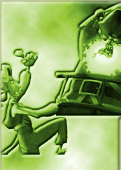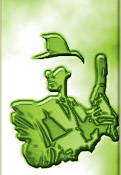
|
This is an RPG adapted from Jin Yong wuxia novel Demi-Gods and Semi-Devils. Prince Duan Yu of Dali received a Buddhist training in his childhood. He learned the Confucian classics, poems and songs, but he knows nothing about martial arts. His father forces him to practice martial arts and Duan Yu decides to escape his home. After the escape the game unfolds a sprawling journey. The novel's plot is reworked with various puzzles that often require objects to solve them. The gameplay involves a lot of secondary characters (NPCs), each of which is implemented with many pronounced simple actions: chopping wood, training with swords, cooking, patrolling the streets, etc. There are hundreds of different sprite animations. The main character can perform many actions: walk, jump, talk to NPCs, interact with objects in the game environment, combine some objects to activate game events, and much more. The game is implemented in isometric 3D. Moreover, each textured surface, each piece of interior is executed in the best traditions of ancient Chinese culture; all of them were carefully designed and implemented in a style typical of the Song (宋) Dynasty. For the most part, at first glance, one can erroneously say that this is an Adventure genre, but the basic role-playing elements are still there: health, attack and defense. And with further passage, your parameters will only increase. By the way, at the beginning of the game you don't even know martial arts. Therefore, technically speaking, this is still an RPG genre, but with a noticeable admixture of Adventure and Action elements. In the gameplay, you can talk, pick up something from the map and use wearable items for their intended purpose. The interface is very friendly. Most of the display in the game menu is represented by clear, large-sized icons. The control is implemented on the keyboard. Dialogues are always displayed as a line centered at the bottom of the screen. You can save anywhere in the passage. Movements (in isometric view): Home, End, PgUp, PgDn; call the game menu - Esc. The gameplay mechanics are quite complex. Even the very debut in the game should be difficult for a novice user. The bottom line is this. You play the role of Duan Yu and are in your father's house, in legal terms, under house arrest. Guards are posted outside. In the house you need to take 20 liang from the chest. Then a couple of times you still need to try to open the main door. In a short dialogue, the guard standing outside will clearly explain to you the reasons for imprisonment (it’s not allowed, sir, and that’s all ...). Ultimately, you must escape through the window located in the farthest corner of the house (behind the bed, near the washbasin). To do this, standing near the desired window, you must apply the game menu item "Action" - the icon "hand". For an unprepared user, even a Chinese-speaking one, all this presented a certain obstacle to mastering. Probably, therefore, only screenshots of the very first moments of the gameplay, when your hero is imprisoned in the house, dominate the web. Further - immediately a surprise. Any time the guards patrolling the streets find you, you are again imprisoned - here are the obvious elements of "stealth action". But more than that: in subsequent locations, some of the characters you meet can easily turn you in if you enter into a dialogue with them, and then house arrest again. Standard locations are implemented as several houses located on a spacious square area. There are also winding dungeons and caves in which other characters are often absent. The essence of the passage mechanics is extremely simple: enter into dialogues with NPCs, find various objects on the map, solve riddles, upgrade your role-playing parameters, etc. |








